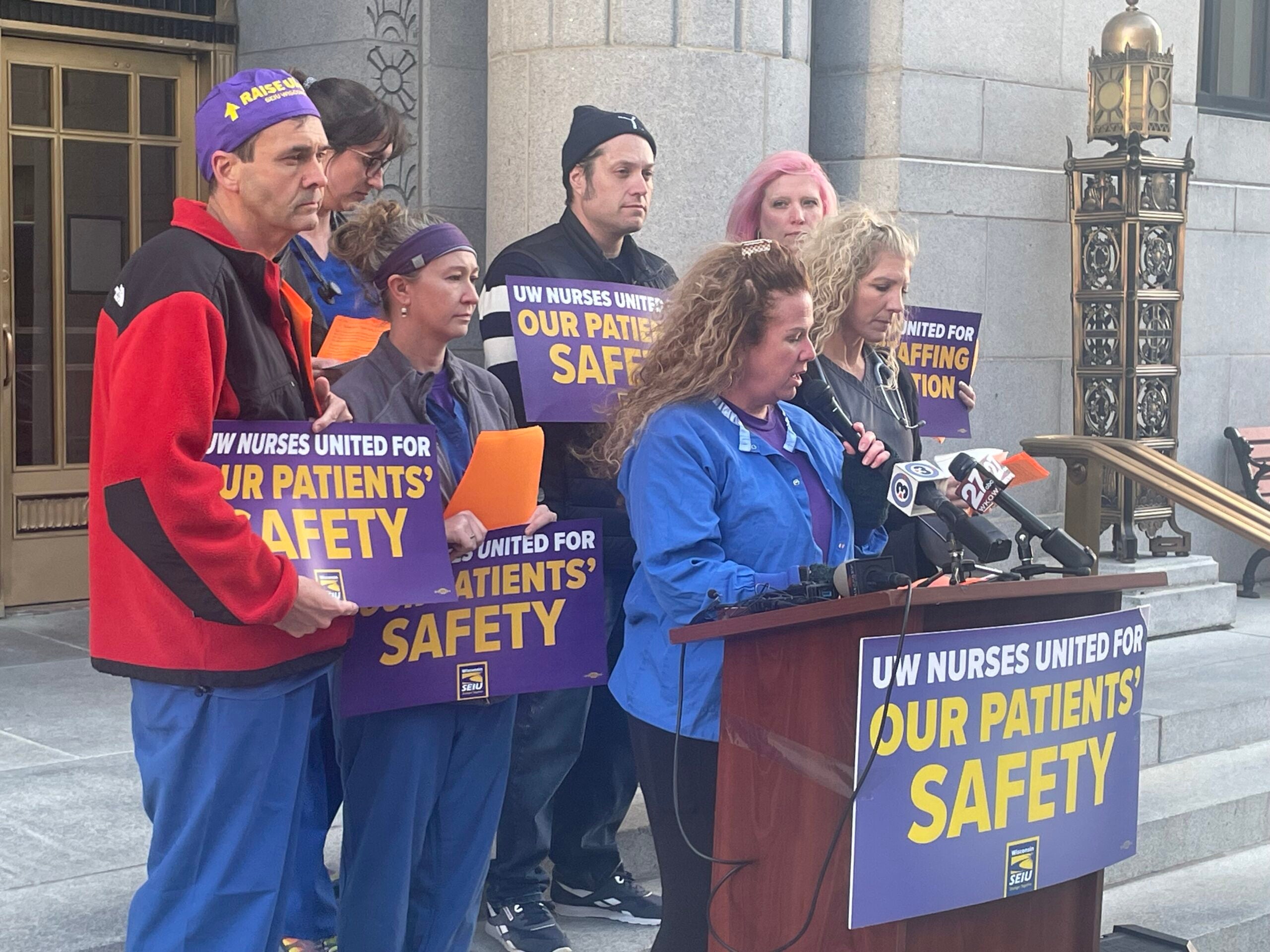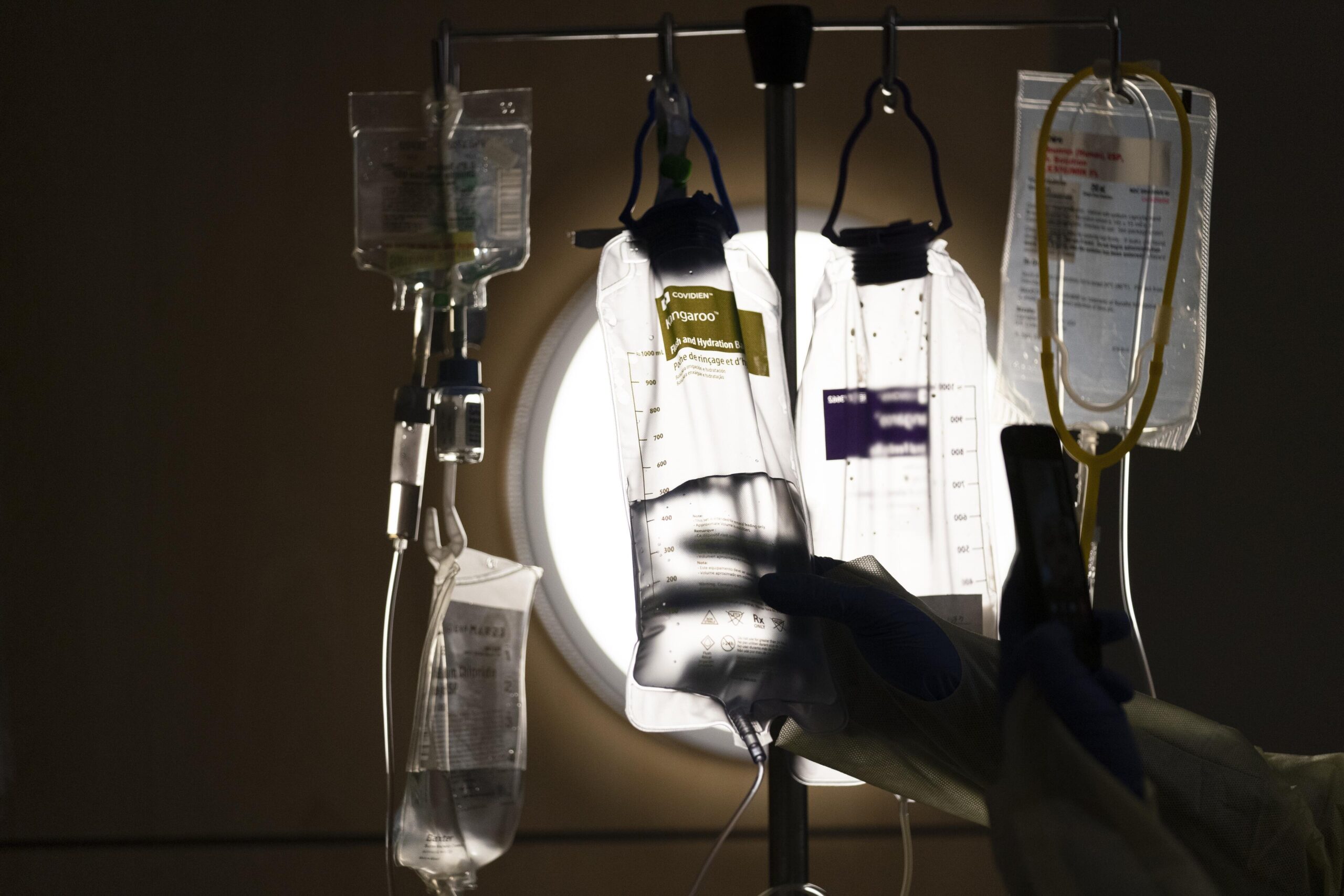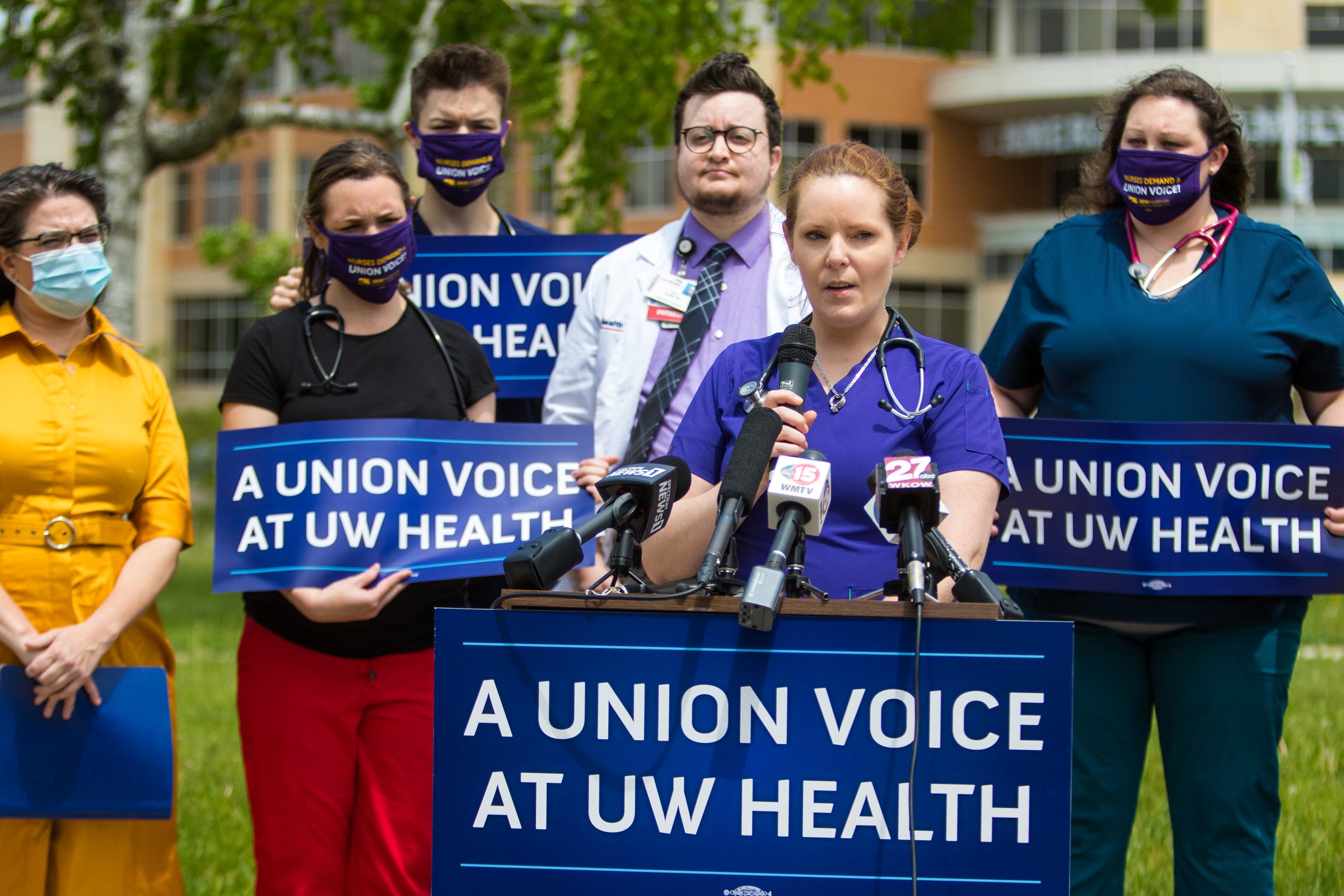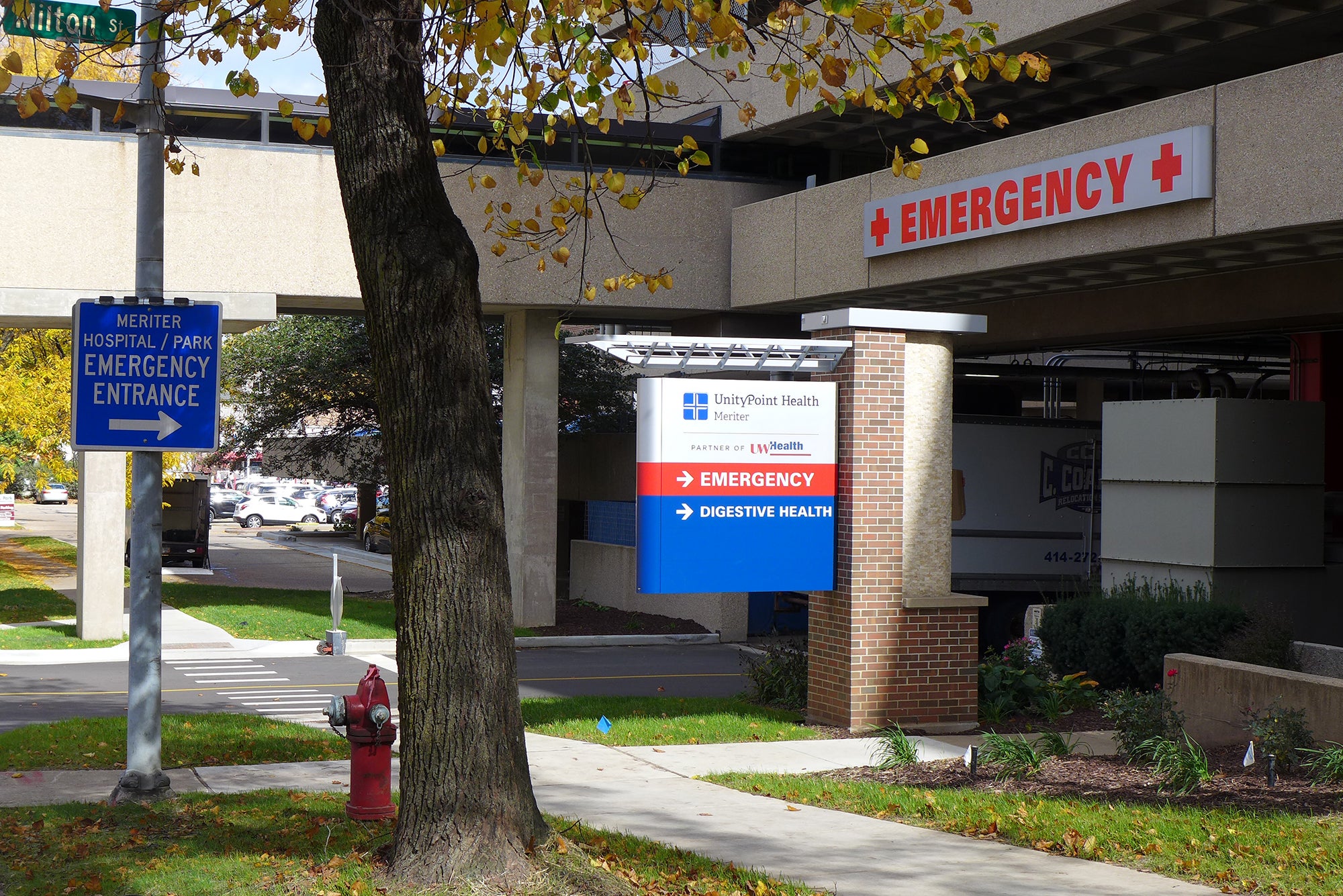Nurses at UW Health submitted paperwork Thursday urging Wisconsin’s Department of Health Services to investigate concerns about patient safety.
It’s the latest escalation amid an ongoing labor dispute with the health care system, as nurses who are pushing for collective bargaining power raise alarms about the effects of under-staffing, employee turnover and worker burnout.
Nurses gathered Thursday afternoon at DHS’ headquarters in Madison to submit paperwork known as “notice of risk” forms. They’ve filled out more than 100 of those forms so far, according to a Thursday news release from Service Employees International Union Wisconsin, which represents health care workers among other members.
News with a little more humanity
WPR’s “Wisconsin Today” newsletter keeps you connected to the state you love without feeling overwhelmed. No paywall. No agenda. No corporate filter.
The move comes more than a year after nurses reached an agreement with the health system in September 2022, designed to avert a strike. In the wake of that memorandum of understanding, nurses are allowed to choose to become dues-paying members of SEIU Health Wisconsin.
Since reaching the agreement, nurses have been having “meet and discuss” sessions with administrators to go over issues, although the health system maintains the union does not have collective bargaining power.
In a Sept. 25 email to UW Health staff, the system’s CEO Dr. Alan Kaplan characterized the complaints to state health officials as a negotiating tactic.
“Recently, the Service Employees International Union (SEIU) and a small group of our nurses reached out to us to say they have gathered patient safety issues from UW Health staff and threatened to submit them to the Department of Health Services (DHS) if we did not meet their demands related to compensation,” the email said. “Patient safety is not a bargaining chip in this health system, and we have reached out to DHS to inform them of this situation.”
Prior to filing the paperwork with DHS, nurses say they shared a “detailed summary” of the forms with administrators, adding that they resorted to the latest step after more than a year of trying and failing to have their concerns addressed internally.
Meanwhile, nurses say staffing issues are jeopardizing patient safety.
“Nurses are so frazzled and extremely understaffed in the UW surgical department that serious accidents affecting patients have happened and will continue to happen if action isn’t taken — it’s absolutely heartbreaking,” Sara Booth, a nurse with 12 years experience who submitted a notice to DHS, said in a statement. “A lot of nurses, including myself, have had to work 16-hour shifts due to short staffing, which is exhausting. Sadly, these working conditions can lead to patient injuries and mistakes. My fellow nurses and I have repeatedly pleaded with management to address this crisis.”
Turnover is especially bad within UW Heath’s inpatient surgical department, nurses said.
“We’ve had some cases where newer nurses have not felt experienced or qualified enough to participate in the surgeries that they are assigned to, so they have broken down into tears,” nurse Mary Jorgensen said at a news conference outside the DHS building in downtown Madison.
In response, a UW Health spokesperson said the organization has hired a net increase of 250 registered nurses over the last year, and said the sytem’s turnover rate is below the national median. The hospital system also disputed statistics from the union about staff leaving UW’s inpatient surgical department.
“While these threats and tactics from SEIU are unfortunate, we always look forward to working with DHS on how we can meet the health care needs of our patients and our community,” UW Health spokesperson Emily Greendonner wrote in an email to Wisconsin Public Radio. “We have no doubt they will give any serious concerns due diligence.”
Complaints involve ‘SOS’ nurses
Many of the recently-submitted complaints raise alarms about the fate of a team of critical care nurses known as “SOS” or “Save Our Shift,” nurses. UW Health announced last month it would be eliminating the SOS team, the union nurses said.
UW Health nurse Shari Signer characterized SOS nurses as the “emergency services” of the hospital.
“They are not assigned to any particular department, but rather go wherever they are needed,” she said, adding that their duties include filling staffing gaps, helping with difficult blood draws and intervening in life-threatening situations. “I’ve seen them show up in a room where the patient was on the verge of death, gasping for air and blood was everywhere. They didn’t even blink an eye. They jumped right in and administered the vital care that was needed.”
Greendonner disputed the union’s characterization.
“It’s important to point out that SOS is a role and not a team,” Greendoner said. “It is typically fulfilled through our critical care float team. Far from being eliminated, that clinical care float team has evolved to allow them to practice at the top of their license by focusing their expertise on caring for our critically ill patients at the bedside in our critical care units throughout University Hospital, which is better for staff and for patients.”
Signer accused UW leadership of changing the SOS model unilaterally, without input from frontline nurses.
“UW Health Plan is to just pull nurses from other departments for our rapid response team,” Signer said Thursday afternoon. “But there are several serious flaws with that approach. First, the departments that they would be pulling from are already understaffed, so asking short-staffed nurses to drop everything and answer a rapid response is not a realistic idea and will lead to more burnout. Second, all of the departments at UW Health are highly specialized, so you can’t necessarily pull a nurse from one specialization and put them into an emergency situation and a completely different specialization.”
UW Health nurses have spent years fighting to restore collective bargaining power
There are 545 UW Health nurses who are members of SEIU Wisconsin, according to a UW Health spokesperson. Although he said the union doesn’t give out specific membership numbers, a spokesperson for SEIU Wisconsin confirmed “hundreds” of UW Health nurses are members of the labor organization.
Nurses at the Madison-based health system were previously unionized, but the hospital’s employee unions were phased out in 2014 after former Republican Gov. Scott Walker signed a law, known as Act 10, that gutted labor rights for most public-sector employees.
In 2019, UW nurses first publicly announced their plans to revive their union, but the issue has been legally fraught in the years since.
Last year, hundreds of UW nurses voted to authorize a three-day strike if their union was not recognized. The deal reached in September 2022 averted that planned work stoppage, but, in the nearly 14 months since, nurses have accused UW leaders of failing to give employees a voice under the spirit of the agreement.
In November 2022, the Wisconsin Employment Relations Commission ruled the health system wasn’t legally required to recognize the newly-formed union or to collectively bargain with the group over a contract. The union, however, is challenging that decision.
Wisconsin Public Radio, © Copyright 2025, Board of Regents of the University of Wisconsin System and Wisconsin Educational Communications Board.






